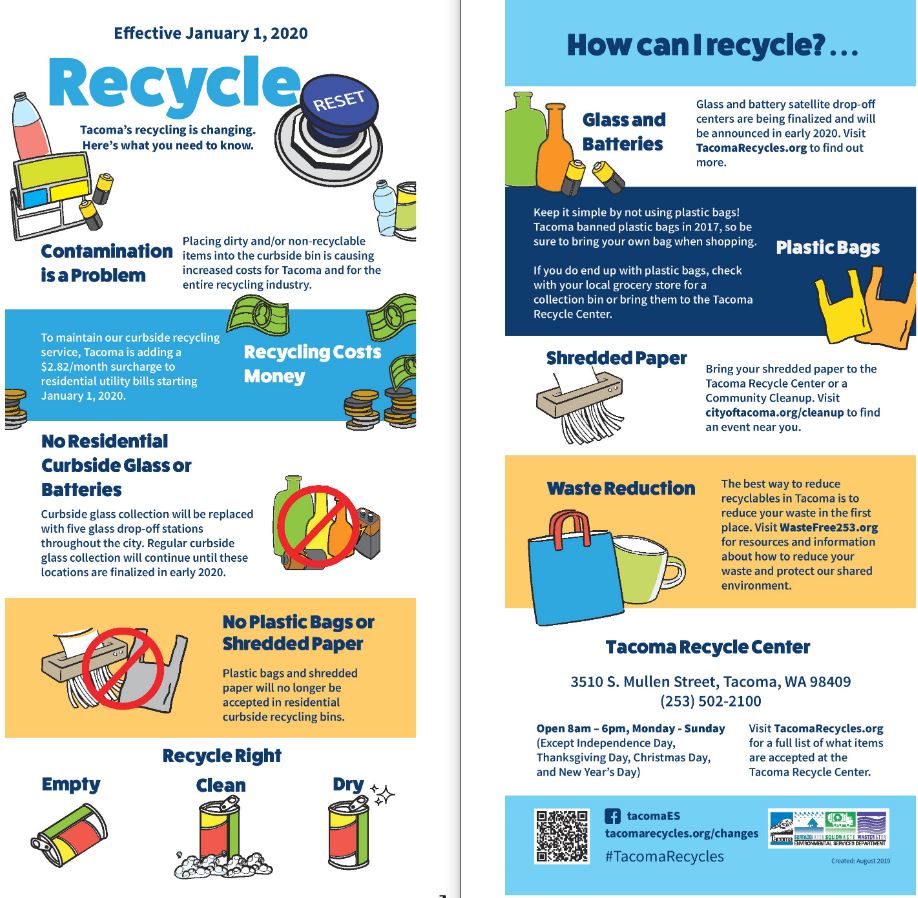New International Regulations to Affect Recycling in Tacoma
The majority of Tacoma’s recyclables are sold overseas, mainly in Asia, where countries have adopted strict policies regarding material quality. Materials that do not meet the new requirements are rejected. There is low to no tolerance for dirty or improperly sorted items. More than ever, it’s important to emphasize quality over quantity and the need for clean recyclables. In the recent past, materials were marketed at a profit. Now as a result of the new policies, the City of Tacoma is facing increased costs to maintain its recycling program.
Did You Know?
-
In 2018, China banned the import of most paper and plastic for recycling.
-
Much of the material China received was considered contamination because it was dirty or wasn’t valuable.
-
This policy shift is causing higher costs for the City of Tacoma’s recycling program.
Recycling Changes Update on October 30, 2019
On October 29, 2019, the Tacoma City Council unanimously approved Ordinance 28623, which establishes the following to changes to the City's residential recycling program.
- Maintain residential curbside commingled recycling service, with minor adjustments to the list (removing shredded paper and plastic bags from the list)
- Stop curbside glass collection and provide satellite recycle centers and/or satellite glass drop-off boxes (anticipated mid-2020)
- Add a $2.32 surcharge per customer per month to cover the increased costs of recycling and provide resources for improved customer recycling education (effective Jan 1, 2020 | updated Jan 1, 2024)
- Residential customers who qualify for Environmental Services' utility affordability assistance program (Discount Rate Program and Bill Credit Assistance Plan) will be exempt from the surcharge. For more information on these programs, please click here.
Watch the public comments and the vote of the ordinance from the October 29, 2019 City Council meeting.
Watch the Recycle Reset segment on Urban Green below to find out more about the surcharge, changes to the program, and the Recycle Reset project.
For a quick glance at how these program changes, and how they might impact you, please see our Recycle Reset flyer below!

For a more in-depth look at the project, please see the Recycle Reset white paper that outlines the entire project including background, options presented for feedback to community members, and the City's education and outreach efforts to inform Council's decision.
View the Recycling White Paper
Additional Resources
Websites
News
- "Changes coming to recycling in Tacoma", Q13 FOX - December 27, 2019
- "Recycling surcharge still headed to Tacoma, but at a lower rate in new proposal", The News Tribune - October 18, 2019
- "Tacoma recycling proposal would add new fee, eliminate curbside pickup for glass", KNKX - July 31, 2019
- "No curbside glass? An extra cost? Whatever, Tacoma needs to embrace changes", The News Tribune - June 26, 2019
- "Tacoma's recycling reset is worth the extra cost". The News Tribune, June 19, 2019
- "Salvaging Tacoma's recycling program to require fees and changes to what goes in the bin", The News Tribune - June 15, 2019
- "Price increase among proposed changes for Tacoma's recycling", Q13 FOX - June 14, 2019
- "Tacoma considers recycling changes", KING 5 - June 11, 2019
- "We Buy Too Much Stuff. Changing Tacoma's Recycling Program, Increasing Fees Won't Fix That", The News Tribune - March 18, 2019
- "Let's Talk About the Future of Curbside Recycling in Tacoma", Channel 253 Podcast - March 7, 2019
- "Curbside recycling pickup could go away in Tacoma, and some people aren't happy about it", KIRO 7 - February 13, 2019
- "Changes to Tacoma recycling could cost you", KING 5 - February 13, 2019
- “Recycling Revamp”, CityLine, TV Tacoma – January 24, 2019
- “China Trash Ban Creates Problems for U.S. Recyclers”, Voice of America News – June 8, 2018
Interested in Getting Involved?
Contact Preston Peck, Recycle Reset Project Lead, at ppeck@cityoftacoma.org or call (253) 593-7707.
Frequently Asked Questions